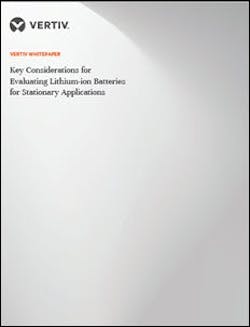Lead-acid batteries have long been the default backup power choice for the uninterruptible power supplies (UPS) that ensure the availability of data centers, communications equipment, and industrial processes. But lithium-ion batteries are challenging this status quo.
While they provide the power and reliability required for these applications, when supported with appropriate monitoring and maintenance practices, they have traditionally been regarded as the weak link in the critical power chain. They tend to be high maintenance, heavy and require frequent replacement.
Now, lithium-ion batteries have emerged as a viable alternative to lead-acid batteries, and a growing number of users are evaluating this technology for UPS applications in mission-critical environments.
The new report from Vertiv explores how lithium-ion batteries have reached a stage of maturity where they can be considered as a viable replacement for lead-acid batteries in UPS applications.
